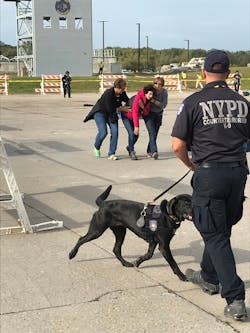Profile: The New York State Preparedness Training Center's New Explosive Detection Canine Program
To enhance its support of EDC teams, DHSES will launch a new event in June called “Canine Week” to bring together the EDC teams from across the state to participate in four days of scenario-based training. EDC teams will rotate through eight core lanes of training on a variety of topics, including dignitary protection, a vehicle-borne IED with a large explosive hide, socialization with helicopters and drones, and tactical emergency casualty care for canine partners.
Canine Week builds on a popular existing annual training event at the SPTC called the Excelsior Challenge. This week-long event brings together bomb technicians, EDC handlers and tactical team operators to participate in scenarios based on the current threat environment.
These training efforts are actively supported by local, state and federal partners, including the New York Metropolitan Transportation Authority (MTA) Police Department, which has the largest EDC program in the nation. “The MTA finds the canine training opportunities at the SPTC top notch,” says Kerwick. “We provide a cadre of expert instructors to support these training events and we also send our newest EDC handlers to participate. The training we conduct at the SPTC is cutting-edge and evolves each year to meet the most current threats we face.”
In addition to world-class training, funding and coordination play integral parts in New York’s EDC program. Early on, DHSES recognized that many local police departments needed financial support for their EDC teams. EDC programs can result in significant overhead for local departments, including purchasing and training the canine, miscellaneous expenses, a vehicle to support the canine and other related equipment expenses.
To receive funding, local agencies must have their EDC assets certified and re-certified annually, based on standards provided by the New York State Division of Criminal Justice Services. They must also complete a detailed capability assessment, using a methodology provided by the DHS Office for Bombing Prevention (OBP). Moreover, EDC teams that receive funding must report their calls for service in the “Bomb Arson Tracking System” (BATS), a national system which is maintained by the Bureau of Alcohol, Tobacco, and Firearms.
In addition to targeted grant funding, DHSES also supports information-sharing and networking opportunities within the canine community through its annual “Explosive Detection Canine Handlers Conference” in Saratoga Springs, NY. This conference was created in 2011 and brings together local, state, federal and international experts to share lessons learned and best practices.
Funding, coordination, and training have combined to provide New York State’s EDC program with a stable base from which to grow. State, local and federal partners continually work together to ensure the state’s EDC program can safely and successfully meet the complex and evolving threat environment.
About the Authors
Meghan Dudley is an Intelligence Analyst with DHSES and oversees Training Administration at the State Preparedness Training Center.
James Turley serves as the Law Enforcement Coordinator for the DHSES Office of Counter Terrorism. He is a 27-year veteran of the Albany, New York, Police Department, where he retired as Chief in 2005.
About the Author
Meghan Dudley
Meghan Dudley is an Intelligence Analyst with DHSES and oversees Training Administration at the State Preparedness Training Center.
James Turley
James Turley serves as the Law Enforcement Coordinator for the DHSES Office of Counter Terrorism. He is a 27-year veteran of the Albany, New York, Police Department, where he retired as Chief in 2005.
